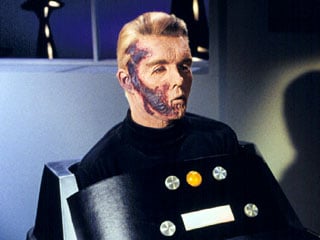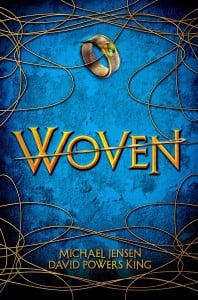(Hey! It’s Chris Bowsman here with another piece on Agnosticism with my favorite geek flavors. The Matrix and Star Trek.)
Adventures of the Super Agnostic: The Experience Machine: Star Trek vs. The Matrix
“What is real? How do you define real? If you’re talking about what you can feel, what you can smell, what you can taste and see, then real is simply electrical signals interpreted by your brain.”

– Morpheus, The Matrix
As a sci-fi guy and neophyte Agnostic, sometimes people ask me about multiple realities and subjectivity, and how I choose what to believe is my reality. So, I spent most the day watching Star Trek, The Matrix, and playing with Robert Nozick’s thought experiment, The Experience Machine, in order to answer this. If there were a machine that could lock you into a simulated experience, any one you wanted, would you plug in? This thought experiment was first introduced to me in 2005, so my go-to response was from The Matrix.
No, I said. I personally wouldn’t plug in.
But, since my first time watching both parts of Star Trek TOS’s “The Menagerie” (My favorite episodes!) in 2009, I think it’s wrong to assume that no one could benefit from plugging in, since it could help a lot of people, and we’re already half-way plugged in, anyway. Mercifully though, you can log out of the internet. For me, the experience machine would be such a waste of my mind, I’d be bored all the time.
But, if such a machine existed, I think it would have therapeutic potential. One that perhaps Nozick didn’t see. He, in my mind, assumes able-bodiedness, claiming that a person in the machine would appear to us to be a “indeterminate blob”. Remember, this thought experiment was before The Matrix. Or maybe even Star Trek. That ignores the evolution of the machines along with the humans. I depend on a machine every day: A power chair, for mobility.
So, I can see that the machine would have therapeutic aspects. For my body it might be good. But not for my mind. I could only imagine what a waste it would be for disabled people who live full lives and want to be with people. Still though, you could leave the machines open for those whose lives are beyond repair. But there’d have to be a long checklist for the requirements. And probably a long waitlist. So, people could decide to cancel it before, but not after you’ve been plugged in.
So on one hand, we have The Matrix’s perspective, on the other we have the more benevolent perspective of Captain Pike. He is described in TOS’s “The Menagerie” by Captain Kirk as “…now a shell of a man.” Perhaps as we’ve grown with machines, we’ve become less trusting of them. Yet, both perspectives present the body as a shell or illusions. Illusions, while therapeutic to Captain Pike, can cause one to lose hope and power. Both perspectives mention this! This is what matters. We want our lived experiences to have power, meaning, influence.
As Vina explains this to Captain Pike: “Because when dreams become more important than reality, you give up travel, building, creating. You even forget how to repair the machines left behind by your ancestors. You just sit, living and reliving other lives left behind in the thought record.” Nonetheless, Pike chooses to relive his life on Talos IV. For Morpheus, this fantastic life is The Matrix, as it is today, in rudimentary non-virtual form: it appears to be growing more invasive, with spyware aplenty.
From these two perspectives, a viable answer comes from of course Captain Kirk, who would no doubt make the thought machine explode by telling the machine it was killing Man rather than serving it: “Man stagnates if he has no ambition, no desire to be more than he is.” (Star Trek TOS: “This Side of Paradise”)
With our understanding and interdependence on computers (especially as devices to assist the disabled!) we have gained great freedoms, and achieved great dreams. But, although those dreams give us goals, it should never outweigh my personal lived experience lest I become a battery for the Matrix. When even the optimistic of space futures warns us about agrees with the darkest of the millennial eve, I think the choice for me is clear to continue to grow and trust my own limited knowledge and instincts.
Thought experiments reveal how we think. In that experiment, you could see some of my experiences too. But, I think this experiment reveals in me once and for all, that I am a philosopher of disability.
In the years I grappled with it, my process has always been the same, and sometimes my love of sci-fi wins out over philosophy. So, this answer is a negotiation between the two. I don’t think that it’s wrong to want to plug in necessarily (as Nozick sets out to prove.), but the want needs to be carefully considered. And like it or not, we’re kind of temporarily plugged in every day to a simulated experience; the digital. Don’t you think it’s best that, like Captain Pike, we enjoy it?
Link to original Thought Experiment PDF: http://www.cas.umt.edu/phil/documents/exper_machine_nozick.pdf


About Chris Bowsman, comic and gaming editor: I’m a passionate disability rights advocate, sci-fi fan, and intercultural communication guy. I have cerebral palsy. I like video games. I have a master’s degree in Intercultural communication and a B.A. in German. I hope to go overseas again someday. Haven’t been to Germany. I’ve been to Spain. I like movies. Raised in Port Huron, MI. Went to College in PA. Looking at the world through the eyes of aliens. Blogspot: www.christopherbowsman.blogspot.com











